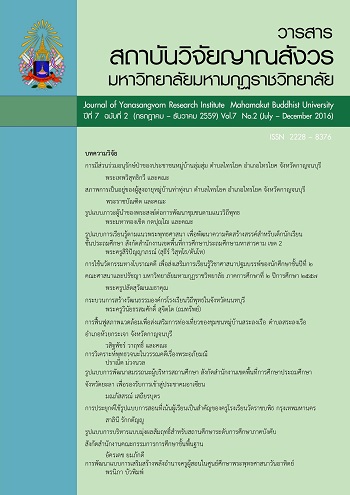THE DEVELOPMENT OF A TEACHER EMPOWERMENT MODEL AT THE BUDDHIST SUNDAY CENTER IN BANGKOK METROPOLIS
Main Article Content
Abstract
This research is a mixed method research that aims (1) to study the state of teacher empowerment at the Buddhist Sunday Center; (2) to build a model of teacher empowerment about Thai etiquette at the Buddhist Sunday Center; and (3) to evaluate the teacher empowerment by using the developed teacher empowerment model. A qualitative research, data was collected by using a semi-structured in depth interview with four Buddhist Sunday Centerexecutives in Bangkok Metropolis who were key informantsselected by a purposive sampling technique. And a quantitative research, the sample consisted of 65 selected teachers at the Buddhist Sunday Centers in Bangkok Metropolitan, questionnaires were used as a tool for data collection. The researcher created a drafting teacher empowerment model about Thai etiquette at the Buddhist Sunday Center and conducted the Focus Group Discussion. To verify the teacher empowerment model, the researcher provided workshops conducted by skillful lecturers in empowerment, knowledge transfer technique, and lecturing and demonstration in Thai etiquette. These lecturers were the principal advisors of the Office of the Permanent Secretary and the Department of Cultural Promotion,Ministry of Culture. The participants were evaluated in seven factors which were: (1) self-respect; (2) responsibility; (3) self-efficacy; (4) organization commitment; (5) self-esteem; (6) self-independence; (7) self-confidence. The researcher evaluated Thai etiquette skills andattitude toward Thai etiquette teaching. The data were statistically analyzed by content analysis, percentage, mean, standard deviation, and T-test. The results are as follows: 1. The current state of the teacher empowerment at the Buddhist Sunday Center was performed at a high level as a whole and while considered separately, all were performed at a high level respectively: Providing support( 4.10, S.D. 0.71); Decision-making involvement ( 4.29, S.D. 0.66); Potential development ( 3.95, S.D. 0.78); Structural improvements ( 4.31, S.D. 0.63); Leadership ( 4.23, S.D. 0.72); t\Teamwork ( 4.37, S.D. 0.68). 2. The teacher empowerment processes consisted of six components which included: (1) Providing support; (2) Decision-making involvement; (3) Potential development; (4) Structural improvements; (5) Leadership; (6) Teamwork. As created by the researcher, the teacher empowerment model showed validity, reliability, consistency, and usefulness. 3. The results of using the teacher empowerment model at the Buddhist Sunday Center found that after participating in the training workshop, the teachers were evaluated at a higher level on Thai etiquette skills than before participating in the training workshop. And the attitude toward Thai etiquette teaching of the teachers who participated in the training workshops was performed at a high level as a whole.
Article Details
References
กรมการศาสนา. (2555). แนวทางการดำเนินงานโครงการศูนย์ศึกษาพระพุทธศาสนาวันอาทิตย์ ปีงบประมาณ พ.ศ. 2555. กรุงเทพฯ: โรงพิมพ์สำนักงานพุทธศาสนาแห่งชาติ
กรมการศาสนา. (2555). วารสาร สายตรงศาสนา ฉบับพิเศษ ศูนย์ศึกษาพระพุทธศาสนาวันอาทิตย์. กรุงเทพฯ: โรงพิมพ์พุทธศาสนาแห่งชาติ.
เติมทรัพย์ จั่นเพชร. "รูปแบบการฝึกอบรมเพื่อเพิ่มทักษะการปฏิบัติงานของผู้ช่วยพยาบาล โดยใช้ชุดการเรียนรู้ด้วยการนำตนเองและสุนทรียสนทนา". วิทยานิพนธ์การศึกษาดุษฎีบัณฑิต สาขาวิชาการศึกษาผู้ใหญ่. บัณฑิตวิทยาลัย: มหาวิทยาลัยศรีนครินทรวิโรฒ.
วรวุฒิ จิรสุจริตธรรม. (2553). "การพัฒนาหลักสูตรเสริมเพื่อพัฒนาทักษะภาวะผู้นำเยาวชนในโรงเรียนอาชีวศึกษาคาทอลิก". วิทยานิพนธ์การศึกษาดุษฎีบัณฑิต สาขาวิชาการบริหารการศึกษา.บัณฑิตวิทยาลัย: มหาวิทยาลัยศรีนครินทรวิโรฒ.
ศิวนาถ ไชยมาศ (2556). รูปแบบการพัฒนาเพื่อเสริมสร้างพลังอำนาจในภาวะผู้นำทางวิชาการของครู. กรุงเทพฯ: สำนักงานเลขานุการสภาการศึกษา.
สำนักงานเลขาธิการสภาการศึกษา. (2550). รูปแบบการปลูกฝังคุณธรรมจริยธรรม ค่านิยมและคุณลักษณะที่พึงประสงค์. กรุงเทพฯ: สำนักงานเลขาธิการสภาการศึกษา.
สมพร เทพสิทธา. (2549). การเดินตามรอยพระยุคลบาท:เศรษฐกิจพอเพียงช่วยแก้ปัญหาความยากจนและการทุจริต. พิมพ์ครั้งที่ 3. กรุงเทพฯ: อัมรินทร์บุ๊ค เซ็นเตอร์.
สภาที่ปรึกษาเศรษฐกิจและสังคมแห่งชาติ. (2555). บทบาทของการศึกษา ศาสนา และวัฒนธรรมในการพัฒนาเยาวชน. เอกสารประกอบการประชุม ในการเสนอความเห็นและข้อเสนอแนะ เมื่อวันที่ 7 ธันวาคม 2555 ณ สำนักงานเลขาธิการสภาการศึกษา กระทรวงศึกษาธิการ.


